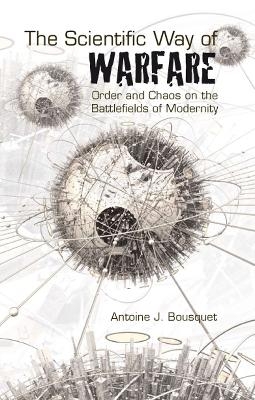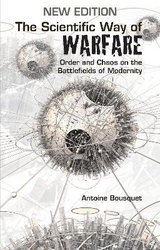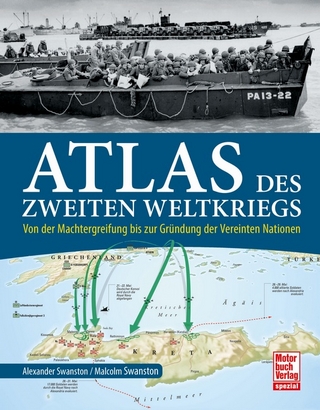
The Scientific Way of Warfare,
Order and Chaos on the Battlefields of Modernity
Seiten
2009
C Hurst & Co Publishers Ltd (Verlag)
978-1-85065-945-7 (ISBN)
C Hurst & Co Publishers Ltd (Verlag)
978-1-85065-945-7 (ISBN)
- Titel erscheint in neuer Auflage
- Artikel merken
Zu diesem Artikel existiert eine Nachauflage
Considers the impact of technologies and scientific ideas on the practice of warfare and the handling of the perennial tension between order and chaos on the battlefield. This work explores modern warfare as the constitution of complex social assemblages of machines whose integration has been made through the deployment of scientific methodology.
Bousquet's book considers the impact of key technologies and scientific ideas on the practice of warfare and the handling of the perennial tension between order and chaos on the battlefield. It spans the entire modern era, from the Scientific Revolution to the present, eschewing traditional accounts of technological change in war and instead exploring modern warfare as the constitution of increasingly complex social assemblages of bodies and machines whose integration has been made possible through the deployment of scientific methodology. Scientific conceptual frameworks have been increasingly applied to the theoretical understanding of war, particularly when they have been associated with influential technologies such as the clock, the engine, or the computer.Conversely, many scientific developments have been stimulated or conditioned by the experience of war, especially since the Second World War and the unprecedented technological and industrial effort that characterised it. The constitution and perpetuation of this scientific way of warfare, marked by an increasingly tight symbiosis between technology, science, and war, are best understood in the context of the state's attempts to make war into a rational instrument of policy. Bousquet also explores the relative benefits (such as providing a unique chain of command over the decision to use nuclear weapons) and disadvantages of centralising and decentralising approaches to military affairs, as exemplified in network-centric theory and in the activities of non-state actors such as insurgents.
Bousquet's book considers the impact of key technologies and scientific ideas on the practice of warfare and the handling of the perennial tension between order and chaos on the battlefield. It spans the entire modern era, from the Scientific Revolution to the present, eschewing traditional accounts of technological change in war and instead exploring modern warfare as the constitution of increasingly complex social assemblages of bodies and machines whose integration has been made possible through the deployment of scientific methodology. Scientific conceptual frameworks have been increasingly applied to the theoretical understanding of war, particularly when they have been associated with influential technologies such as the clock, the engine, or the computer.Conversely, many scientific developments have been stimulated or conditioned by the experience of war, especially since the Second World War and the unprecedented technological and industrial effort that characterised it. The constitution and perpetuation of this scientific way of warfare, marked by an increasingly tight symbiosis between technology, science, and war, are best understood in the context of the state's attempts to make war into a rational instrument of policy. Bousquet also explores the relative benefits (such as providing a unique chain of command over the decision to use nuclear weapons) and disadvantages of centralising and decentralising approaches to military affairs, as exemplified in network-centric theory and in the activities of non-state actors such as insurgents.
Antoine Bousquet is Lecturer in International Relations, Birkbeck College, University of London.
1: Introduction 2: Technoscientific Regimes of Order in Warfare - A Theoretical and Methodological Framework 3: Mechanistic Warfare and the Clockwork Universe 4: Thermodynamic Warfare and the Science of Energy 5: Cybernetics and the Genesis of the Computer 6: Cybernetic Warfare: Computers at War 7: A New Informational Paradigm: Chaos Theory and Complexity Science 8: Towards Chaoplexic Warfare? Network-Centric Warfare and the Non-Linear Sciences
| Erscheint lt. Verlag | 23.2.2009 |
|---|---|
| Reihe/Serie | Critical War Studies |
| Verlagsort | London |
| Sprache | englisch |
| Maße | 145 x 225 mm |
| Themenwelt | Natur / Technik ► Fahrzeuge / Flugzeuge / Schiffe ► Militärfahrzeuge / -flugzeuge / -schiffe |
| Sozialwissenschaften ► Politik / Verwaltung | |
| ISBN-10 | 1-85065-945-1 / 1850659451 |
| ISBN-13 | 978-1-85065-945-7 / 9781850659457 |
| Zustand | Neuware |
| Haben Sie eine Frage zum Produkt? |
Mehr entdecken
aus dem Bereich
aus dem Bereich
von der Machtergreifung bis zur Gründung der Vereinten Nationen
Buch | Softcover (2023)
Motorbuch Verlag
24,90 €



